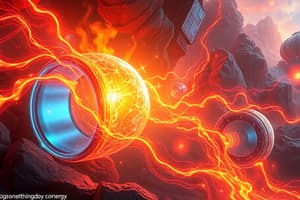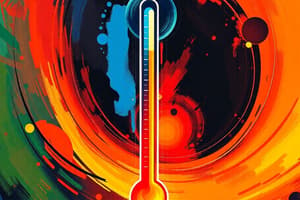Podcast
Questions and Answers
What does it mean for a system to be in thermodynamic equilibrium?
What does it mean for a system to be in thermodynamic equilibrium?
- Pressure and temperature remain constant throughout the process. (correct)
- The system can exchange energy but not matter with its surroundings.
- Pressure and temperature vary throughout the system.
- Energy is being created and destroyed within the system.
Which law describes the relationship between heat supplied to a system and work done by the system?
Which law describes the relationship between heat supplied to a system and work done by the system?
- Law of Increasing Entropy
- First Law of Thermodynamics (correct)
- Second Law of Thermodynamics
- Law of Conservation of Energy
In an ideal thermodynamic cycle, what is the relationship between the internal energy at the beginning and the end of the cycle?
In an ideal thermodynamic cycle, what is the relationship between the internal energy at the beginning and the end of the cycle?
- The internal energy remains the same. (correct)
- The internal energy cannot be determined.
- The internal energy decreases.
- The internal energy increases.
What does the symbol Σ Q represent in the context of thermodynamics?
What does the symbol Σ Q represent in the context of thermodynamics?
Which of the following is the correct constant of proportionality between net heat and net work according to the first law of thermodynamics?
Which of the following is the correct constant of proportionality between net heat and net work according to the first law of thermodynamics?
What must occur for a system operating in a cycle to transfer heat from a cooler to a hotter body?
What must occur for a system operating in a cycle to transfer heat from a cooler to a hotter body?
According to the first corollary of the second law, what does it imply about the conversion of heat into work?
According to the first corollary of the second law, what does it imply about the conversion of heat into work?
What does the first law state about a heat engine that delivers units of heat to the cold reservoir while performing work?
What does the first law state about a heat engine that delivers units of heat to the cold reservoir while performing work?
Which statement represents a violation of the second law of thermodynamics?
Which statement represents a violation of the second law of thermodynamics?
What is the implication of performing work on a system that is trying to transfer heat from a cold to a hot reservoir?
What is the implication of performing work on a system that is trying to transfer heat from a cold to a hot reservoir?
What is the kinetic energy at the inlet if the inlet velocity is 50 m/s?
What is the kinetic energy at the inlet if the inlet velocity is 50 m/s?
What is the power developed by the turbine in the gas turbine unit?
What is the power developed by the turbine in the gas turbine unit?
What is the specific enthalpy of the gases at the outlet of the turbine?
What is the specific enthalpy of the gases at the outlet of the turbine?
In thermodynamics, work is defined as energy that appears at the boundary when what occurs?
In thermodynamics, work is defined as energy that appears at the boundary when what occurs?
If the inlet velocity of a gas is 60 m/s, what would be the kinetic energy at the inlet?
If the inlet velocity of a gas is 60 m/s, what would be the kinetic energy at the inlet?
How is work related to pressure and area in thermodynamics?
How is work related to pressure and area in thermodynamics?
What is the specific volume of the gases at the inlet in the example provided?
What is the specific volume of the gases at the inlet in the example provided?
A process in thermodynamics is called reversible if what condition is met?
A process in thermodynamics is called reversible if what condition is met?
What does the variable 'x' represent in the context of wet vapour?
What does the variable 'x' represent in the context of wet vapour?
Which equation represents the relationship between heat transfer and changes in internal energy for a system?
Which equation represents the relationship between heat transfer and changes in internal energy for a system?
What does the specific enthalpy of vapourization, hfg, represent?
What does the specific enthalpy of vapourization, hfg, represent?
How can the specific volume of wet vapour be approximated under practical conditions?
How can the specific volume of wet vapour be approximated under practical conditions?
Which of the following correctly represents the specific enthalpy of wet vapour?
Which of the following correctly represents the specific enthalpy of wet vapour?
If the pressure of dry saturated vapour is increased, what effect does it generally have on the specific enthalpy of the vapour?
If the pressure of dry saturated vapour is increased, what effect does it generally have on the specific enthalpy of the vapour?
What is the relationship between specific internal energy (U) and the dryness fraction (x) for wet vapour?
What is the relationship between specific internal energy (U) and the dryness fraction (x) for wet vapour?
When calculating the work done (W) in a system, which of the following equations is correct?
When calculating the work done (W) in a system, which of the following equations is correct?
What is the first step to determine the temperature of the steam in a rigid vessel?
What is the first step to determine the temperature of the steam in a rigid vessel?
How is the dry saturated temperature found when cooling the steam until the pressure is 11 bar?
How is the dry saturated temperature found when cooling the steam until the pressure is 11 bar?
What is the formula used to calculate the final dryness fraction of the steam after cooling?
What is the formula used to calculate the final dryness fraction of the steam after cooling?
In an Otto cycle, what does the 'swept volume' refer to?
In an Otto cycle, what does the 'swept volume' refer to?
What happens to the steam's energy when the vessel is cooled to a pressure of 11 bar?
What happens to the steam's energy when the vessel is cooled to a pressure of 11 bar?
What contributes to calculating the specific volume of steam?
What contributes to calculating the specific volume of steam?
What does the equation $t - 175.4 = \frac{?y}{x (179.9 - 175.4)}$ represent in the context of the steam calculations?
What does the equation $t - 175.4 = \frac{?y}{x (179.9 - 175.4)}$ represent in the context of the steam calculations?
Which aspect of the Otto cycle makes it suitable for spark-ignition engines?
Which aspect of the Otto cycle makes it suitable for spark-ignition engines?
Flashcards are hidden until you start studying
Study Notes
Thermodynamic Equilibrium
- A system is in thermodynamic equilibrium when pressure and temperature remain constant.
- Properties like pressure and temperature must be uniform throughout the system.
- Systems can be classified into open systems (fluid in a turbine) and closed systems (fluid in a cylinder).
First Law of Thermodynamics
- Energy conservation principle: energy can neither be created nor destroyed.
- In a thermodynamic cycle, the net heat supplied is proportional to the net work done: ΣQ ∝ ΣW.
- Proportionality constant: 1 kilocaloric = 4.18 kJ.
Steady Flow Energy Equation
- Commonly represented as ṁ(c₁ + h₁) + Q̇ + Ẇ = ṁ(c₂ + h₂).
- Kinetic Energy (K.E) can be calculated from fluid velocities at the inlet and outlet.
- Example calculations show input and output conditions, mass flow rates, and energy exchanges in a turbine.
Work and Heat
- Work is defined as energy transfer when a force moves an object through distance: W = Fd = (PA)d.
- Work is measured in Joules (J).
- Heat appears at system boundaries due to temperature difference with surroundings.
Reversible Processes
- A reversible process allows a system to return to its original state without changes in surroundings.
- Heat cannot be continuously converted into work without work being done on the system (Clausius' Second Law).
Clausius' Statement of the Second Law
- It’s impossible to create a system that operates in a cycle and transfers heat from a cooler body to a hotter body without work being done.
Specific Heat and Entropy
- Specific enthalpies and internal energies are critical to heat and work transfer calculations.
- Dryness fraction (x) indicates the mass of dry vapor in a mixture, while wetness fraction represents liquid mass.
Heat Transfer Equation
- Q + W = U₂ - U₁ relates heat, work, and internal energy changes.
- Enthalpy change from saturated liquid to saturated vapor is called specific enthalpy of vaporization (hfg).
Specific Volume and Properties of Wet Steam
- Specific properties (volume, enthalpy, internal energy) depend on pressure and dryness fraction.
- Practical formulas substitute for volumetric calculations and can gauge total heat transfer during state changes.
Otto Cycle
- The Otto cycle serves as the ideal model for spark-ignition engines, based on air standard assumptions.
Assignments and Example Calculations
- Example problems highlight the cooling processes, steam states in rigid vessels, and thermodynamic efficiency.
- Calculations involve determining temperature, pressure, and evaluating changes in states and properties through various thermodynamic principles.
Studying That Suits You
Use AI to generate personalized quizzes and flashcards to suit your learning preferences.




